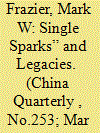| Srl | Item |
| 1 |
ID:
179283


|
|
|
|
|
| Summary/Abstract |
Situated far from coastal cities and foreign concessions, Chengdu yields insights into the role of the local press and its specific publics in the political evolution of the late Qing and early Republic. Despite its remote location, Chengdu developed its own modern press in the late Qing, relying on print entrepreneurs and modern journalists recruited from the ranks of the local literati and traditional sociability, in particular teahouses. They all played a role in forming a modern reading public which came to understand itself as a distinct local political community in dynamic interaction with national politics and transnational networks. The local press evinced three successive but intertwined ideals of publicness: as a link between the state and the people and a vector of enlightenment, as a professional forum for public opinion and as a tool for political mobilization. In solidifying public opinion around the local community, the press served as a forum and catalyst for political activism in the 1911 Railroad Protection movement and the 1919 May Fourth movement, events which were shaped as much by local dynamics as they were by national developments.
|
|
|
|
|
|
|
|
|
|
|
|
|
|
|
|
| 2 |
ID:
190961


|
|
|
|
|
| Summary/Abstract |
This article makes an intervention in the study of the May Fourth Movement by examining the role the mass media played in the diplomatic and domestic mobilization processes set in motion by China’s experience at the Paris Peace Conference. In contrast with the mainstream narrative that constructs the May Fourth Movement as a spontaneous response to the loss of Shandong at Versailles, this article shows that it was preceded by a proactive diplomatic strategy to mobilize ‘public opinion’ over the Shandong question. The Chinese delegation’s decision to launch a media campaign in support of their diplomatic agendas at Versailles inadvertently turned domestic media into a platform for political debate. As a result of competition between the political elites who dominated the mediascape, discussions over the Shandong question shifted from focusing on international diplomacy to domestic politics in the spring of 1919. An examination of the ‘media war’ during the May Fourth Movement further demonstrates that the political elites’ variable ability to adopt media strategies to shape and channel public opinion resulted in changing the political landscape of the post-May Fourth era. By focusing on the role of the mass media in the diplomatic and domestic mobilization in China’s strategy at Versailles and during the May Fourth Movement, this article forges new connections between the international and the domestic. It also invites further reflections on the nature of the May Fourth Movement by showing that the media was a tool of political mobilization that connected the political elite to the masses.
|
|
|
|
|
|
|
|
|
|
|
|
|
|
|
|
| 3 |
ID:
190402


|
|
|
|
|
| Summary/Abstract |
The watershed in modern Chinese politics known as the May Fourth Movement (1919) offers insights into how a single protest event can quickly diffuse to other regions, draw in new participants and produce legacies in contentious politics. This article examines the May Fourth protests from the perspective of “eventful sociology” – an approach that examines how protests, repression and other contingent events link together to bring about landmark political episodes. It traces the sequence of protest and repression events in Beijing and draws on an original database of protest and repression events in Shanghai to emphasize the haphazard sequencing of actions and information flows that led the Chinese government to reverse its stance and concede to protestors’ demands. An eventful account illustrates how past protest sequences can produce a long-term impact on subsequent protest events. It also calls for greater awareness of “single sparks” that initiate protest sequences and unexpected political outcomes.
|
|
|
|
|
|
|
|
|
|
|
|
|
|
|
|